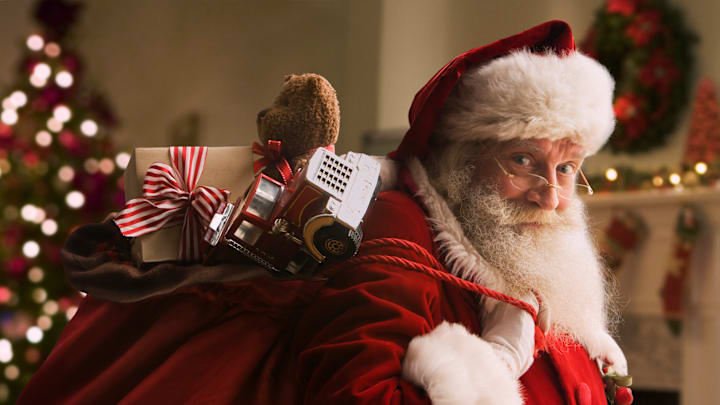It’s a day every parent dreads: When their child approaches them and begins asking pointed questions about Santa Claus. How can Santa travel the globe in one night? How do reindeer fly? How can he fit into a chimney? Is Santa real?
At some point, common sense will intervene and a child will begin to suspect Santa is a mythological creature, like the Tooth Fairy or a person who returns shopping carts to their proper place. What should a parent say? And should they be misleading a kid in the first place?
- Is it OK to lie to your kids about Santa?
- When do kids stop believing in Santa?
- How to Talk to Your Kids About Santa Claus
Is it OK to lie to your kids about Santa?
According to Victoria Talwar, Ph.D., author of The Truth About Lying: Teaching Honesty to Children at Every Age and Stage, telling children Santa Claus exists doesn’t occupy the same fraught territory as other forms of deception. “The Santa lie falls more into the realm of tradition and culture,” Talwar told Mental Floss. “If I’m lying to kids to get them to go to bed early, that’s different from Santa. Santa is cultural. Everywhere you go, Santa Claus is there. It’s not just something the parent made up. It’s something quite different, outside the realm of a full parental lie.”
In Talwar’s view, Santa’s mythology is a buy-in that can have a net positive effect on a child’s outlook. “The sentiments behind Santa are really positive,” Talwar said. “You can turn around and make magic for others. It has underlying principles we want to communicate with children. We want them to be honest. We should make sure we’re underscoring that in how we talk to them. Values like generosity, giving, caring for others, all those values are part of the Christmas story.”
Research indicates that roughly 85 percent of children 5 years of age think Santa is real. Not long after that, a child may begin to question Santa’s existence, when logic starts to intervene or a friend or classmate begins insinuating the jolly old man might be fictional.
You May Also Like ...
Add Mental Floss as a preferred news source!
When do kids stop believing in Santa?
But age isn’t the only way to determine when a child is catching on to reality. According to Mona Delahooke, Ph.D., a pediatric psychologist based in California, Santa suspicions can happen at any time.
“It’s more about developmental stage than chronological age,” Delahooke told Mental Floss. “Each child will have their own trajectory based on their social and emotional development. But somewhere between 3 to 5 years old, children begin to wonder about the difference between ‘pretend’ and ‘real.’ That’s when some of the questions can start about the logistics of the Santa story.”

According to Talwar, that curiosity doesn’t necessarily require a parent come clean. It may instead be more beneficial for a kid to ask questions.
“Let the child guide that,” Talwar said. “If they say, ‘Well, Santa isn’t real.’ Or they say, ‘I heard Santa isn’t real,’ the parent can say, ‘Well, what do you think?’ If they ask, ‘How does Santa get around the world?’ ‘Well, how do you think he does?’”
The reason to avoid coming clean is that kids “may not be ready to leave that magical childhood story. They’re just questioning it. You can see where the child is. They’ll tell you.”
How to Talk to Your Kids About Santa Claus
And if they insist? While some parents may play a game of semantics, insisting Saint Nicholas was a real person (a 3rd-century monk) or that Santa Claus lives (one man changed his name in 2012, making that true on paper), it’s probably better just to lay it out. “If they still get back to wanting you to answer, you need to be honest,” Talwar said. “I don’t think parents should lie. It’s a general rule. Parents lying to children is not a good thing. It can have long-term negative impacts on parents and on childhood.”
Some kids, Delahooke said, might have a foot in and a foot out: They doubt Santa, but it might be more fun to play along. “That’s where the power of our imaginations and symbolic thinking can allow a child to hold two realities at once: ‘I kind of know Santa’s not real, but I’m going to pretend that he is!’ That’s OK,” she said.

Can a child feel deceived once they find out the truth? Possibly, Delahooke notes. “Sometimes, kids hear about it at school or somewhere without a compassionate adult presence and they are surprised in a stressful way,” she said. “Sometimes, a child may feel that a parent lied to them. It all depends on each child’s perception. One child may feel betrayed and another may not.”
While Santa Claus may not be a toxic fiction, Delahooke adds the same cannot be said for Elf on the Shelf, the relatively recent holiday trend that sees parents putting up an elfin figure to monitor a child for misbehavior. “Elf on the Shelf, if used to surveil children, is harmful,” she said. “It’s a trick that seems innocuous but has an underlying message [of] ‘don’t get caught’—instead of ‘do the right thing.’”
A version of this story originally ran in 2022; it has been updated for 2025.
